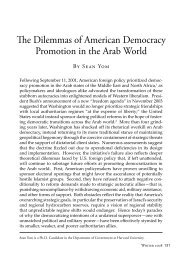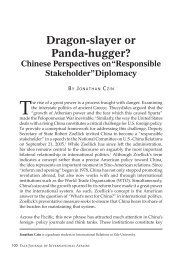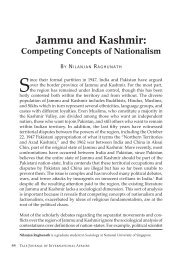Women and the Global Economy - Yale Journal of International Affairs
Women and the Global Economy - Yale Journal of International Affairs
Women and the Global Economy - Yale Journal of International Affairs
You also want an ePaper? Increase the reach of your titles
YUMPU automatically turns print PDFs into web optimized ePapers that Google loves.
WOMEN AND THE GLOBAL ECONOMY<br />
that have figured out how to integrate women as employees <strong>and</strong> managers,” explains<br />
William Foote, Root Capital’s founder <strong>and</strong> CEO. “It is a sign that <strong>the</strong>y are seeking<br />
talent <strong>and</strong> opportunities.” 10 Root Capital’s mission is to provide capital <strong>and</strong> financial<br />
education to small <strong>and</strong> growing businesses in rural areas <strong>of</strong> developing countries.<br />
Approximately 20 percent <strong>of</strong> Root Capital’s investments are in women-led businesses,<br />
but <strong>the</strong> company sees real opportunity in influencing <strong>the</strong> o<strong>the</strong>r 80 percent <strong>of</strong><br />
its portfolio to think more carefully about how <strong>the</strong>y are integrating <strong>and</strong> promoting<br />
women. “We are considering <strong>of</strong>fering a discount<br />
on our loans—<strong>and</strong>/or providing financial management<br />
training alongside <strong>the</strong> credit—for companies<br />
that meet certain gender-balance criteria. This isn’t<br />
about social engineering—we see this as a good<br />
business practice that we want to encourage among<br />
our portfolio companies. We know it will pay <strong>of</strong>f for<br />
<strong>the</strong>m, <strong>and</strong> for us,” says Foote.<br />
Private-sector<br />
interventions… can<br />
play a significant role<br />
in breaking down<br />
barriers <strong>and</strong> changing<br />
deeply entrenched<br />
detrimental cultural<br />
practices for women.<br />
Private-sector interventions such as <strong>the</strong>se, if replicated<br />
across <strong>the</strong> global economy, can play a significant<br />
role in breaking down barriers <strong>and</strong> changing deeply<br />
entrenched detrimental cultural practices for women.<br />
In India, for example, <strong>the</strong> government has tried for<br />
decades to get parents to place more value in girls,<br />
but patriarchy dies hard. With <strong>the</strong> spread <strong>of</strong> low-cost<br />
sonogram technology across rural India, parents show <strong>the</strong>ir continuing preference for<br />
boys by illegally aborting unwanted girls. In some parts <strong>of</strong> <strong>the</strong> country, as many as 140<br />
boys are born for every one hundred girls. Some fascinating new studies, however,<br />
indicate that maybe <strong>the</strong> private sector can succeed in changing this pernicious dynamic<br />
more effectively than government policy. Pr<strong>of</strong>essor Robert Jensen <strong>of</strong> UCLA’s School <strong>of</strong><br />
Public <strong>Affairs</strong> conducted a study providing three years <strong>of</strong> recruiting services to young<br />
girls in r<strong>and</strong>omly selected Indian villages to help <strong>the</strong>m get jobs in <strong>the</strong> business process<br />
outsourcing industry. At <strong>the</strong> end <strong>of</strong> <strong>the</strong> study, girls in <strong>the</strong> selected villages were more<br />
likely to be in school <strong>and</strong> had greater measured body mass index (BMI) than girls in<br />
control villages (an indication <strong>of</strong> improved caloric consumption). Paid employment<br />
was also 2.4 percent higher for women aged 18–24. 11 According to Jensen’s research,<br />
this small, low-cost intervention not only contributed to raising girls’ education <strong>and</strong><br />
health, but even weakened couples’ strong preference to give birth to sons. As <strong>the</strong><br />
private sector exp<strong>and</strong>s economic opportunities for women in India, girls’ value to<br />
<strong>the</strong>ir families will grow <strong>and</strong> more parents should welcome <strong>the</strong> birth <strong>of</strong> a daughter.<br />
General Electric (GE) is a company with a significant stake in seeing <strong>the</strong> attitudes <strong>of</strong><br />
parents in India become more favorable to girls. GE makes <strong>the</strong> sonogram technology<br />
that is widely used for sex-selective abortion in <strong>the</strong> country, although that practice<br />
has been illegal since 1994. To fur<strong>the</strong>r deter <strong>the</strong> widespread practice, <strong>the</strong> Indian<br />
government passed a law in 2002 holding <strong>the</strong> manufacturers <strong>and</strong> distributors <strong>of</strong><br />
sonogram equipment responsible for preventing female feticide. GE’s response was<br />
to create a series <strong>of</strong> training programs, sales-screening procedures, <strong>and</strong> post-sale<br />
Winter 2011 29









